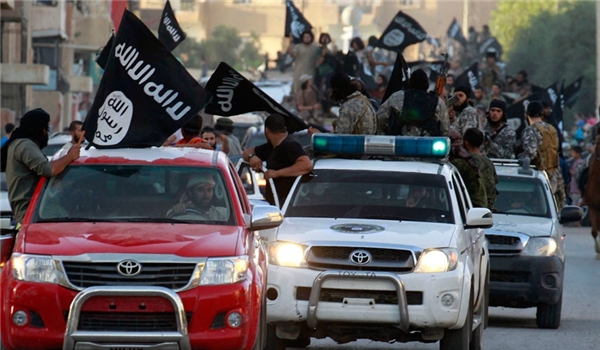
RNA - Take this for instance: The limited subset of Syrian rebels who have been participating in the peace talks in Astana suspended participation indefinitely. A rebel statement issued demands that the Syrian government cede considerable territory to them which had been lost before the ceasefire took effect, and for the military to unilaterally release rebel prisoners that they continue to hold.
The questions of why this is happening transmutes itself into some very different questions and reasons, no longer asking why the prospects for peace are still low and why rebels have suspended participation indefinitely, but asking how the people and government of Syria will respond, what they intend to do now that it happened:
1) After six years of relentless war, there is no realistic prospect of Syria defeating all foreign-backed terrorist groups and insurgencies for good. Long after Raqqa and other ISIL-held areas have been liberated by Syrian Army and allied forces, foreign-backed suicide bombers will still be driving vehicles full of explosives able to blow themselves up and cause horrific loss of life in the heart of well-protected, liberated cities and communities. Unable to stand against the firepower of allied forces, there are signs that ISIL and Al-Qaeda are moving many of their fighters and figures out of Raqqa – and Mosul in Iraq - to rural areas where they can hide more easily.
2) The people of Syria have every reason to be frightened because the United States, Saudi Arabia, and Israel are not done with the war-torn country yet. Their sleeper cells will be waiting to emerge and slaughter civilians in post-war Syria. For parties and terror proxies who preside over the networks of rackets and arms smuggling routes that strangle the Levant, the show must go on.
3) The imposition of US-led sanctions on Syria during and after the long years of war is one reason why normal life will not return even when there is no fighting. Syria will remain a convenient enemy for war-party Washington.
4) The Trump White House has no intention to let go of the idea to establish so-called “safe zones” - which is completely different from the de-escalation zones that has gone under discussion in the Astana talks, both in type and nature. President Trump claims they will help to protect civilians and to achieve lasting peace for humanitarian and many other reasons. A grand bargain, however, is out of reach, because Iran, Syria and Russia see it as the first step toward a partition of the country.
5) The British government is considering to expand military action in Syria. Prime Minister Theresa May seeks to have the freedom to join the US in airstrikes against the forces of Syrian government. Foreign Secretary Boris Johnson says the UK might launch such airstrikes without UN or parliamentary approval. It means the British government, just like its American ally, has no intention to end the war on Syria. They have no intention to work through the UN, and above all, they don’t intend to bend themselves to getting a political settlement.
6) The Pentagon regime officials are pushing for more funding for US military facilities in Syria, able to support further escalations of US deployments of both ground troops and combat equipment onto the Levant. They play up the continued false narrative of “Iranian-Russian aggression,” which has been securing the Pentagon so much extra funding in recent months, suggesting that the US will have more permanent deployments of combat troops in Syria to counter them. Which is to say the US will not have a relatively limited military presence on the Syrian border, with other troops dedicated to occupations and wars around the region.
7) Early deployments of US special forces in Syria were intended to support Kurdish separatists like YPG. While the continued increase of ground troops is officially presented as part of the ISIL war, a growing number of US troops find themselves deployed as “buffers” to try to prevent fighting between US proxy forces and/or to protect them against Russian-Syrian airstrikes. They are also aimed at preventing the Turkish military from further attacks against the Kurdish YPG. The Americans are playing referee between terror proxies and regional allies they are nominally supportive of in the ongoing war on Syria.
No wonder the people of Syria are concerned. Even if they liberate the entire country, foreign-backed suicide bombers will still be there to blow themselves up. They are so dismissive of the US government’s plan to establish “safe zones” as well. The “safe zones” will not be there to protect people. They are intended to allow terror proxies to go out and attack Syrian targets with virtual impunity, and quickly flee back to the “safe zones” - safe in the knowledge that US warplanes would attack anyone who tried to retaliate against them. The War Party wants the conflict to continue, its terror proxies wish it would continue, and its regional partners in crime will make it continue.
847/940